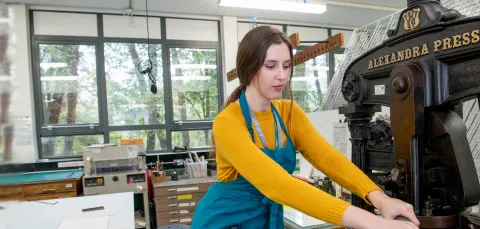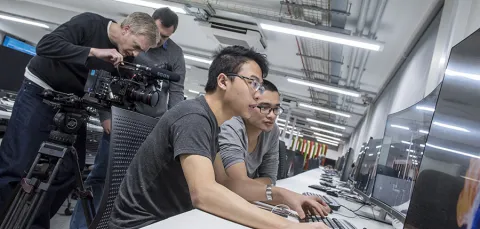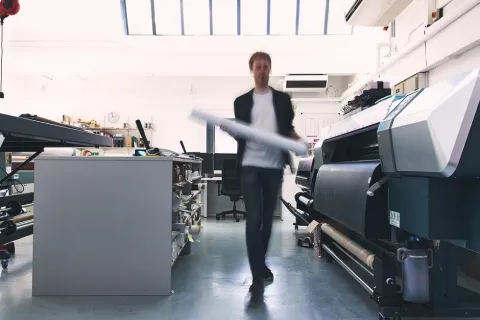About this course
Combine your passion for creative art and design with digital technologies on this master's degree in creative technologies. Based at Winchester School of Art (WSA), we'll prepare you for a range of careers in the arts and technology sectors.
You'll develop your creative and technical skills in systems thinking and design. You'll learn through projects where you'll design and build immersive digital experiences. These experiences will go beyond digital screen formats to include fabrication, textiles and 3D printing.
You can choose to focus on:
- programming skills
- user experience design
- physical fabrication
- art and design practice
- project management
You'll use industry standard equipment including virtual reality and augmented reality systems. You'll learn to programme as well as look at robot design. At WSA, you'll be part of a creative community that makes it easy to collaborate across subject areas.
On this creative technologies course you’ll have the opportunity to:
- plan, design and develop digital projects
- develop computational cognitive and practical skills
- visit museums, galleries, and industry events
- take part in industry facing projects with partners such as IBM and Moving Brands
We regularly review our courses to ensure and improve quality. This course may be revised as a result of this. Any revision will be balanced against the requirement that the student should receive the educational service expected. Find out why, when, and how we might make changes.
Our courses are regulated in England by the Office for Students (OfS).
Course lead
Your course leader is Dr Seth Giddings. His interests include cultures, technologies and economics of games, toys, and play. He researches AI and robotics in art, games, and everyday life.
Learn more about these subject areas
Course location
This course is based at Winchester.
Awarding body
This qualification is awarded by the University of Southampton.
Download the Course Description Document
The Course Description Document details your course overview, your course structure and how your course is taught and assessed.
Entry requirements
You’ll need a 2:2 degree or equivalent international qualification in any subject or relevant work experience in arts, humanities, design, music, languages, computing or technology. You should include your portfolio that articulates interest and practice in the sector of creative technologies.
English language requirements
If English isn't your first language, you'll need to complete an International English Language Testing System (IELTS) to demonstrate your competence in English. You'll need all of the following scores as a minimum:
IELTS score requirements
- overall score
- 6.5
- reading
- 6.0
- writing
- 6.0
- speaking
- 6.0
- listening
- 6.0
We accept other English language tests. Find out which English language tests we accept.
If you don’t meet the English language requirements, you can achieve the level you need by completing a pre-sessional English programme before you start your course.
Pre-masters
If you don’t meet the academic requirements, you can complete a pre-master's programme through our partnership with OnCampus. Learn more about the programmes available.
Got a question?
Please contact us if you're not sure you have the right experience or qualifications to get onto this course.
Email: enquiries@southampton.ac.uk
Tel: +44(0)23 8059 5000
Course structure
This is a full-time master’s course. You’ll study for 12 months, from September to the following September.
In the first 9 months (semesters 1 and 2) you’ll study the taught part of your course. This is made up of modules that everyone on the course takes, and optional modules.
In the first semester you'll be introduced to key technical skills and applications in creative technologies. The emphasis will be on programming for creative work.
Compulsory modules cover:
- ideas in art and technology
- collaborative practices
- creative computing
In semester 2 you'll build on your skills. Compulsory modules cover:
- creative technologies
- creative industry research
Through an optional module you'll extend your specialism in one of these areas:
- experimental publishing
- visual culture
- exploring the visual language of display
You’ll also prepare a research proposal for your final project and decide on the best approach.
In semester 3, you’ll work independently on your final project. You’ll have one-to-one meetings with your supervisor during this time to discuss your progress.
Want more detail? See all the modules in the course.
Modules
The modules outlined provide examples of what you can expect to learn on this degree course based on recent academic teaching. As a research-led University, we undertake a continuous review of our course to ensure quality enhancement and to manage our resources. The precise modules available to you in future years may vary depending on staff availability and research interests, new topics of study, timetabling and student demand. Find out why, when and how we might make changes.
For entry in academic year 2024 to 2025
Year 1 modules
You must study the following modules :
Collaborative Practices
In this module, you will collaborate with a research group at WSA or in the wider university, an arts and cultural organisation, or a creative technology practitioner to co-design and undertake a project. You will be supported in identifying and approachi...
Creative Industry Research
On this module, you will identify and develop research on an areas of the broad field of creative technologies industry that connects with your creative or vocational interests and trajectory. This could be an organisation in the creative and cultural sec...
Creative Technologies 1: coding
In this module you will explore principles of programming and creative production for innovative technological applications. Using accessible platforms including block-based coding, simple robotics and front-end web design you will work on exercises that ...
Creative Technologies 2: environments
In this module you will build on your technical and creative practice in programming to explore the possibilities of applied and pervasive computing. Through workshops you will experiment with hardware and material systems that might include wearable tech...
Final Project in Creative Technologies
In this module you will build on the skills, experience and creative interests you have developed across the programme to complete an independent project that makes an innovative contribution to the creative technologies sector. Integrating theory and pra...
Ideas in Art and Technology
In this module you will engage with key historical, theoretical and aesthetic contexts for contemporary creative technology production. You will explore ideas that relate to your own practice through academic research and creative responses.
You must also choose from the following modules :
Experimental Publishing
The consideration of what publishing actual means today remains a relevant question for any creative practitioner. Over the past few years we have seen a huge rise in self-publishing, print on-demand services, tweeting and social media, from post-digital ...
Exploring the Visual Language of Display
The module provides thematic examples of the theories and practices of visual presentation and display explored through interdisciplinary and critical contexts appropriate to the MA pathways. It offers a number of critical “tools”, enhanced through refere...
Visual Culture
We live in a world that is saturated by images, from the far reaches of space to the sub-atomic level and just about everything in between. Images seem to have a special power in our lives, playing a part in the constructions of who and what we are and t...
Learning and assessment
Learning
As well as lectures and seminars led by subject experts you'll learn through:
- workshops and demonstrations
- interdisciplinary workshops
- study visits such as to industry linked partners or design studios
- industry related projects
Assessment
Assessment could include:
- reports
- digital portfolio
- group and individual projects
- design research and development
- technical exercises
- 2D and 3D models and prototypes
Academic Support
We'll assign you a personal academic tutor, and you'll have access to a senior tutor.
Careers and employability
Employability skills
This degree will allow you to develop and evidence subject-specific and targeted employability skills. This includes the required skill set for a range of future careers, further study, or starting your own business.
The skills you can expect to focus on and gain from this course include:
- Research
- Critical thinking
- Commercial awareness
- Self-management
- Confidence
- Leadership
- Communication
- Teamwork
- Creativity
- Networking
- EDI leadership
- Adaptability
- Problem solving
- Resilience
The employability and enterprise skills you'll gain from this course are reflected in the Southampton skills model. When you join us you'll be able to use our skills model to track, plan, and benefit your career development and progress.
Download skills overview
Career pathways
Graduates commonly work in a range of organisations or sectors including:
Games Studios,
Production Companies,
Advertising and Broadcasting Companies,
Creative Agencies,
PR and Communications Firms,
Education Providers,
Software Developers.
- Machine learning developer
- Mobile developer
- Video game developer
- Computer music engineer
- Full stack web developer
- E-learning programmer
- Application programmer
- UX designer
- Creative technologist
- Software engineer
- Data analyst
- Database manager
- Graphic designer
- Multimedia artist
- Artificial intelligence specialist
- Augmented reality developer
- Digital marketing specialist
- Computer scientist
- Data scientist
- Software engineer
- Software developer
- Technical consultant
- Technology analyst
- Web developer

Work experience opportunities
Choosing to do work experience is a great way to enhance your employability, build valuable networks, and evidence your potential. Learn about the different work and industry experience options at Southampton.
Careers services and support
We are a top 20 UK university for employability (QS Graduate Employability Rankings 2022). Our Careers, Employability and Student Enterprise team will support you. This support includes:
- work experience schemes
- CV and interview skills and workshops
- networking events
- careers fairs attended by top employers
- a wealth of volunteering opportunities
- study abroad and summer school opportunities
We have a vibrant entrepreneurship culture and our dedicated start-up supporter, Futureworlds, is open to every student.
Your career ideas and graduate job opportunities may change while you're at university. So it is important to take time to regularly reflect on your goals, speak to people in industry and seek advice and up-to-date information from Careers, Employability and Student Enterprise professionals at the University.
Fees, costs and funding
Tuition fees
Fees for a year's study:
- UK students pay £9,250.
- EU and international students pay £30,300.
Deposit
If you're an international student on a full-time course, we'll ask you to pay £2,000 of your tuition fees in advance, as a deposit.
Your offer letter will tell you when this should be paid and provide full terms and conditions.
Find out about exemptions, refunds and how to pay your deposit on our tuition fees for overseas students page.
What your fees pay for
Your tuition fee covers the full cost of tuition and any exams. The fee you pay will remain the same each year from when you start studying this course. This includes if you suspend and return.
Find out how to pay your tuition fees.
Accommodation and living costs, such as travel and food, are not included in your tuition fees. There may also be extra costs for retake and professional exams.
Explore:
10% alumni discount
If you’re a graduate of the University of Southampton, you could be eligible for a 10% discount on your postgraduate tuition fees.
Postgraduate Master’s Loans (UK nationals only)
This can help with course fees and living costs while you study a postgraduate master's course. Find out if you're eligible.
Southampton Arts and Humanities Deans Global Talent Scholarship
Ten scholarships of £10,000 each are available to international students studying for an undergraduate degree or a postgraduate master’s degree in Arts and Humanities.
Find out more about the Southampton Arts and Humanities Deans Global Talent Scholarship, including eligibility, deadlines and how to apply.
Other postgraduate funding options
A variety of additional funding options may be available to help you pay for your master’s study. Both from the University and other organisations.
Funding for EU and international students
Find out about funding you could get as an international student.
How to apply
- Use the blue 'apply for this course' button on this page to take you to our postgraduate admissions system.
- Create an account which gives you access to your own application portal. .
- Search for the course you want to apply for.
- Complete the application form and upload any supporting documents.
- Pay the £50 application assessment fee, (there are some exemptions, check terms and conditions).
- Submit your application.
For further details of our admission process, read our step by step guide to postgraduate taught applications.
Application deadlines
There are different application deadlines for this course. Applications are expected to close:
- International students: Tuesday 29 July 2025, midday UK time
- UK students: Tuesday 9 September 2025, midday UK time
We advise applying early as applications may close before the expected deadline if places are filled.
Application assessment fee
We’ll ask you to pay a £50 application assessment fee if you’re applying for a postgraduate taught course.
This is an extra one-off charge which is separate to your tuition fees and is payable per application. It covers the work and time it takes us to assess your application. You’ll be prompted to pay when you submit your application which won’t progress until you've paid.
If you're a current or former University of Southampton student, or if you’re applying for certain scholarships, you will not need to pay the fee. PGCE applications through GOV.UK and Master of Research (MRes) degree applications are also exempt. Find out if you’re exempt on our terms and conditions page.
Supporting information
When you apply you’ll need to submit a personal statement explaining why you want to take the course.
You’ll need to include information about:
- your knowledge of the subject area
- why you want to study a postgraduate qualification in this course
- how you intend to use your qualification
References are not required for this programme.
Please include the required paperwork showing your first degree and your IELTS English language test score (if you are a non-native English speaker) with your application. Without these, your application may be delayed.
You'll need to submit a portfolio of your work, as follows:
- In a Word document or PDF, with your name clearly visible in the first page, include around 6 ‘sets’ of work that demonstrate your interests and experience across creative and technical practice.
- If you have a creative background, show us your work in art, design or music, and give some evidence of your interest in technical practice such as computing, making or creative software use.
- If you have a computing or technical background, include and explain your best and most innovative work. Also include evidence of creative interests and practice such as photography, drawing or music-making.
- A set might be a sequence of photographs exploring a theme, or it could be a single developed work such as a painting, audio work, written work, Arduino experiment, piece of code or application.
- Include preparatory materials in a set where appropriate, such as sketchbooks, prototypes, moodboards or models. You can include links to your work on online portfolios, blogs, coding sites, audio and video sites.
- Annotate your sets by including short texts giving some context to your ideas and explaining anything that isn’t clear from your images and links.
What happens after you apply
You'll be able to track your application through our online Applicant Record System.
We will aim to send you a decision 6 weeks after you have submitted your application.
Unfortunately, due to number of applications we receive, we may not be able to give you specific feedback on your application if you are unsuccessful.
Equality and diversity
We treat and select everyone in line with our Equality and Diversity Statement.
Got a question?
Please contact us if you're not sure you have the right experience or qualifications to get onto this course.
Email: enquiries@southampton.ac.uk
Tel: +44(0)23 8059 5000
Related courses
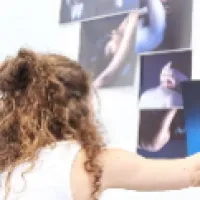
Arts and Cultural Leadership

Communication Design
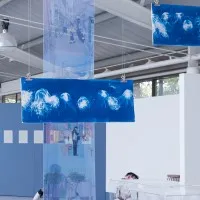
Contemporary Curating

Design Management
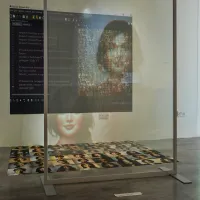
Digital Media Practices

Fashion Design

Fashion Management

Fashion Marketing and Branding

Fine Art

Global Advertising and Branding

Global Media Management

Luxury Brand Management

PGCE Art and Design

PGCE Design and Technology

